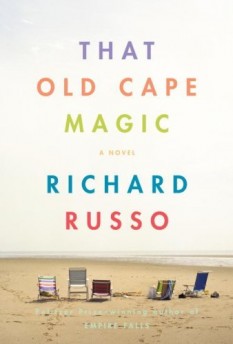 Reviewed:
Reviewed:
That Old Cape Magic by Richard Russo
Knopf, 272 pp., $25.95
Like the old jokes about sex and pizza, it’s possible there’s no such thing as a bad Richard Russo novel. His latest, That Old Cape Magic, is far from his strongest, and it continues some mildly troubling trends for him, but it has enough of his trademark strengths to recommend it.
Russo is famously concerned with class, having been raised in the declining regions of upstate New York and setting the majority of his fiction there. The characters in his first three novels, Mohawk, The Risk Pool and Nobody’s Fool, oversee their tough lives with a combination of stoicism and earthy humor. This moment from Mohawk sums up the attitude:
The calendar above the grill is for 1966, a year out of date. Whoever gave Harry the calendar the year before didn’t give him a new one this year. The months are the same and Harry doesn’t mind being a few days off.
Empire Falls expanded on the structures of his previous novels, but its more complicated plot didn’t always feel like an improvement. The book was much better than most of what’s published, but the Pulitzer it won seemed more fitting as a general appreciation of all Russo’s work. Six years passed before he published a follow-up, Bridge of Sighs, a hefty novel that portrayed the familiar New York climes with an eye occasionally cast toward Italy. Russo is allowed to spread his wings, of course, but his fiction seems to benefit when, like his characters, he doesn’t. His success — the Pulitzer, his consistent bestseller status, more and more time spent in recent years as a screenwriter — has rarely been mirrored in the lives of his creations. (Henry Devereaux, Jr., the English department chair in Straight Man, comes to mind as an exception.)
In That Old Cape Magic, Jack Griffin is a 57-year-old former screenwriter, now an English professor on the east coast. Griffin was raised by academic parents whose work trapped them in the Midwest (they add a colorful gerund between its two syllables when they speak of it). Their great solace was an annual summer vacation to Cape Cod, where Griffin finds himself as the novel begins. He’s there to attend the wedding of his daughter’s best friend. He also hopes to find a proper place to scatter his father’s ashes, which are in the trunk of his car, and have been for several months.
The novel occasionally flashes back to the summers of Griffin’s boyhood:
By the time Griffin was a high school freshman, which marked the last of their Cape vacations, they’d rented just about everywhere. Each summer, when they handed over the keys at the end of their stay, the rental agent always asked if they wanted to book it for next year, but they always said no, which made Griffin wonder if the perfect spot they were searching for really existed. Perhaps, he concluded, just looking was sufficient in and of itself.
Having inherited some of his parents’ perfectionism (read: dissatisfaction), Griffin is primed for an acute midlife crisis. His marriage has been mostly happy, but he and his wife, Joy, have trouble deciding if they’re equally at peace with the results of the Great Truro Accord, a document they drew up on their honeymoon to map out the rest of their lives. The novel’s second half moves toward another wedding — and adds another urn of ashes to the trunk — during which time Griffin’s marriage and the rest of his life begin to fray.
One summer long ago, Griffin had worked as an assistant on a road-construction crew, and while considering his current emotional state, he recalls an interaction between two of the other crew members, Albert and Louie:
Where conversation was concerned, they’d been minimalists. “Are we plumb?” Albert would ask after a good hour of silence. “We were a minute ago,” Louie would respond, placing his level on the two-by-four in question, cocking his head to look at the bubble. “We’re plumb some,” he’d tell his partner, shrugging, which Griffin understood meant close enough. “We’re not building a skyscraper.” As they explained it to Griffin, a half bubble off in a foundation was no big deal unless you were going up thirty stories. Of course, half a bubble, factored over thirty floors, was no small thing. That, he now realized, was how he’d been feeling two days ago when he’d packed that bag and headed to Boston alone — thirty floors up and half a bubble off. Plumb the last time they checked, but now, suddenly, plumb some.
Trying to get back on track requires Griffin to think long and hard about his parents, his wife, his daughter, his memory, his expectations and assumptions. Russo has always made rumination a joy, and Griffin’s thinking (and overthinking) is no different. That Old Cape Magic still feels as slight as its size and its following so closely on the heels of Bridge of Sighs might suggest, and the humor it mines can be silly and toothless compared to earlier novels.
But Russo has a rare gift for conveying the genuine emotional depth of situations and language that can verge on platitudinous. If he’s avoiding the dangers of such situations more narrowly as he ages, he’s still avoiding them. The plainspoken, knowing-but-essentially-optimistic tone that’s become synonymous with his name is what keeps the hipper crowds from raving about his work, but it’s what guarantees that the work will last. The exceptional confidence of his storytelling voice is timeless.
Anyone who fell in love with Russo through The Risk Pool or Nobody’s Fool might judge his more recent work as plumb some. And they know that’s close enough.
John Williams is the editor of The Second Pass.
Mentioned in this review:
That Old Cape Magic
Bridge of Sighs
Empire Falls
The Risk Pool
Nobody’s Fool
Mohawk
Straight Man

